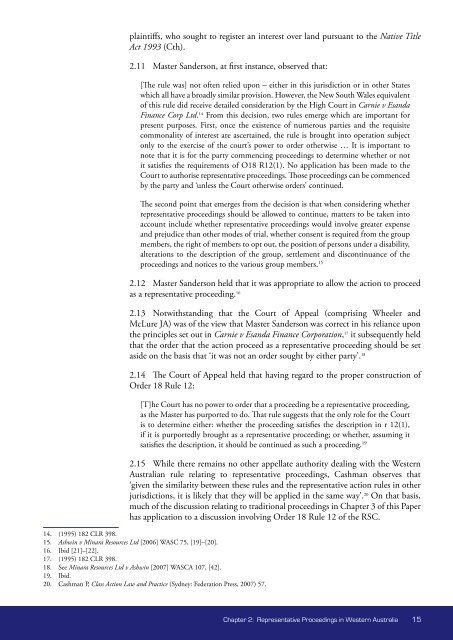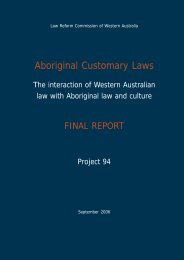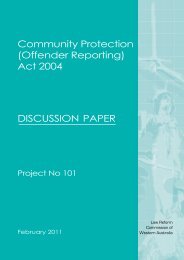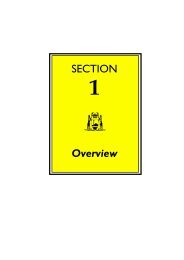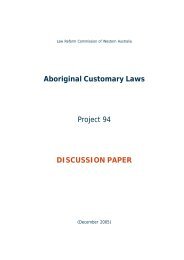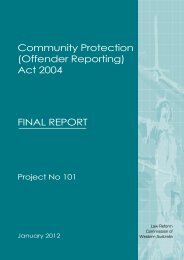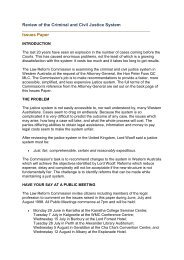Discussion Paper - Law Reform Commission of Western Australia
Discussion Paper - Law Reform Commission of Western Australia
Discussion Paper - Law Reform Commission of Western Australia
Create successful ePaper yourself
Turn your PDF publications into a flip-book with our unique Google optimized e-Paper software.
plaintiffs, who sought to register an interest over land pursuant to the Native Title<br />
Act 1993 (Cth).<br />
2.11 Master Sanderson, at first instance, observed that:<br />
[The rule was] not <strong>of</strong>ten relied upon – either in this jurisdiction or in other States<br />
which all have a broadly similar provision. However, the New South Wales equivalent<br />
<strong>of</strong> this rule did receive detailed consideration by the High Court in Carnie v Esanda<br />
Finance Corp Ltd. 14 From this decision, two rules emerge which are important for<br />
present purposes. First, once the existence <strong>of</strong> numerous parties and the requisite<br />
commonality <strong>of</strong> interest are ascertained, the rule is brought into operation subject<br />
only to the exercise <strong>of</strong> the court’s power to order otherwise … It is important to<br />
note that it is for the party commencing proceedings to determine whether or not<br />
it satisfies the requirements <strong>of</strong> O18 R12(1). No application has been made to the<br />
Court to authorise representative proceedings. Those proceedings can be commenced<br />
by the party and ‘unless the Court otherwise orders’ continued.<br />
The second point that emerges from the decision is that when considering whether<br />
representative proceedings should be allowed to continue, matters to be taken into<br />
account include whether representative proceedings would involve greater expense<br />
and prejudice than other modes <strong>of</strong> trial, whether consent is required from the group<br />
members, the right <strong>of</strong> members to opt out, the position <strong>of</strong> persons under a disability,<br />
alterations to the description <strong>of</strong> the group, settlement and discontinuance <strong>of</strong> the<br />
proceedings and notices to the various group members. 15<br />
2.12 Master Sanderson held that it was appropriate to allow the action to proceed<br />
as a representative proceeding. 16<br />
2.13 Notwithstanding that the Court <strong>of</strong> Appeal (comprising Wheeler and<br />
McLure JA) was <strong>of</strong> the view that Master Sanderson was correct in his reliance upon<br />
the principles set out in Carnie v Esanda Finance Corporation, 17 it subsequently held<br />
that the order that the action proceed as a representative proceeding should be set<br />
aside on the basis that ‘it was not an order sought by either party’. 18<br />
2.14 The Court <strong>of</strong> Appeal held that having regard to the proper construction <strong>of</strong><br />
Order 18 Rule 12:<br />
[T]he Court has no power to order that a proceeding be a representative proceeding,<br />
as the Master has purported to do. That rule suggests that the only role for the Court<br />
is to determine either: whether the proceeding satisfies the description in r 12(1),<br />
if it is purportedly brought as a representative proceeding; or whether, assuming it<br />
satisfies the description, it should be continued as such a proceeding. 19<br />
2.15 While there remains no other appellate authority dealing with the <strong>Western</strong><br />
<strong>Australia</strong>n rule relating to representative proceedings, Cashman observes that<br />
‘given the similarity between these rules and the representative action rules in other<br />
jurisdictions, it is likely that they will be applied in the same way’. 20 On that basis,<br />
much <strong>of</strong> the discussion relating to traditional proceedings in Chapter 3 <strong>of</strong> this <strong>Paper</strong><br />
has application to a discussion involving Order 18 Rule 12 <strong>of</strong> the RSC.<br />
14. (1995) 182 CLR 398.<br />
15. Ashwin v Minara Resources Ltd [2006] WASC 75, [19]–[20].<br />
16. Ibid [21]–[22].<br />
17. (1995) 182 CLR 398.<br />
18. See Minara Resources Ltd v Ashwin [2007] WASCA 107, [42].<br />
19. Ibid.<br />
20. Cashman P, Class Action <strong>Law</strong> and Practice (Sydney: Federation Press, 2007) 57.<br />
Chapter 2: Representative Proceedings in <strong>Western</strong> <strong>Australia</strong> 15


